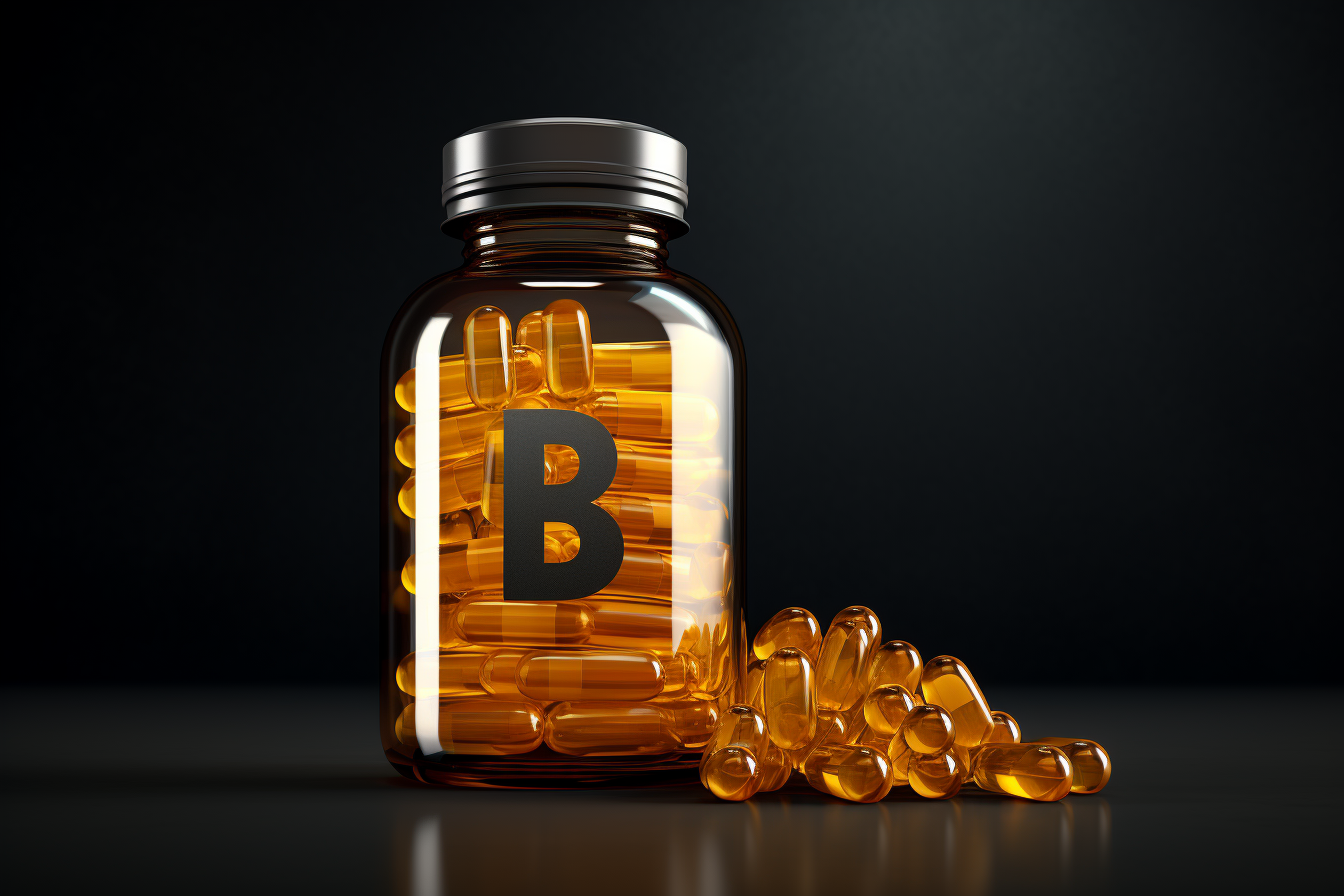Introduction to Vitamin B Complex and B Vitamin Supplements
Hands up, who isn’t baffled by the convoluted world of vitamins!? Well, buckle up, because we are about to embark on a rollercoaster ride through the realms of Vitamin B Complex and B Vitamin Supplements. Like Jack and Jill, these two are likely companions, or as some people would say, two peas in a pod. However, it’s not just their camaraderie that’s noteworthy; their roles in maintaining our health are beyond impressive. They’re like the quarterback in American football, controlling and coordinating many operations in our body, yet often overlooked as unsung heroes.
From vitamin B1 to B12, there are eight B vitamins, each boasting its unique health benefits. They’re like the dream team of nutrients, aiding everything from our nervous system’s well-being to our red blood cells’ optimal functioning. Oh, and did I mention that they’re water-soluble too? That means they’re the ‘here today, gone tomorrow’ sort, requiring a daily intake to replenish our reserves. How can you ensure this, you ask? Well, naturally occurring in a range of food sources, they could be just a bite away. But let’s face it, amidst our hectic lives, getting enough from our diet can seem like finding a needle in a haystack. That’s where B vitamin supplements come to the rescue!
Here’s a list of some you might consider:
– Vitamin B2: Good source? Milk. You want a supplement? Seek out riboflavin.
– Vitamin B3: Found in the likes of chicken, but when it comes to supplements, it’s called niacin.
– Vitamin B5, or pantothenic acid: Mushrooms have it, but you can also find it in supplement form.
– Vitamin B6: Great sources include fish and whole grains, or find it in supplement form as pyridoxine.
– Vitamin B7: Good old eggs are your friend here, but in supplement circles, it’s known as biotin.
– Vitamin B9, also known as folic acid: Asparagus and fortified cereals are rich in this, but it’s also in multi-vitamin supplements.
– Vitamin B12: Here’s lookin’ at you, beef liver and clams, but supplements may be needed, especially for older adults.
But, be warned, my friends! Dosage is critical, too much can lead to serious side effects as certain B vitamins can lead to toxicity. Not enough? Well, that could end up in deficiencies. Juggling the intake of these eight wonder nutrients might seem like a Herculean task but worry not – the B-complex supplements have got your back. To summarize, in the great poker game of life, B vitamins and their supplements are really the Ace in the pack!
Understanding the Different Types of Vitamin B: Vitamin B1, B2, B3, B5, B6, B7, B9, and B12
Well, hold onto your hats! You know, it’s a wild ride when we go diving into the world of vitamins, and that holds true for the extended family of Vitamin B. Golly, there’s a bunch of them, eight to be exact! So stick with me, we’re going to shed some light on the different types of B vitamins: B1, B2, B3, B5, B6, B7, B9, and B12, and let me tell you, they’re all essential for our health. These B-complex vitamins are water-soluble fellas, implying that they mix well with water and are swiftly evacuated from the body, making it necessary for us to get enough B vitamins daily.

Now, why on earth do we even need these, you might ask? I’m glad you did! These vital vitamins play a crucial role in keeping our bodies running like well-oiled machines. They help us generate energy from the food we eat, keep our nervous systems dancing to the right beat, and assist in the formation of red blood cells. So, believe you me, a vitamin B deficiency isn’t something you want on your plate!
Let’s make a swift pit stop for a handy-dandy bullet point list:
– Vitamin B1 (Thiamine): Bang-up for brain function and turning food into energy. Spinach and legumes are great sources of B1.
– Vitamin B2 (Riboflavin): Helps with red blood cell formation and supports our mighty vision and skin health. The milk you pour over your morning cereal has got this guy!
– Vitamin B3 (Niacin): This fella deals with our digestive and nervous systems, and helps convert food into energy. Turkey and chicken breast are chock-full with this one.
– Vitamin B5 (Pantothenic Acid): Aids in hormone and cholesterol production. You can find this stud in chicken and beef!
– Vitamin B6 (Pyridoxine): Necessary for the production of mood chemicals in your brain and crucial for brain development. This buddy likes to chill out in fish and potatoes.
– Vitamin B7 (Biotin): Known for strengthening hair and nails, it’s often added to beauty products. Egg yolks and almonds are its favorite hangouts.
– Vitamin B9 (Folate or Folic Acid): No kidding around, this seriously safeguards against brain defects during pregnancy. Leafy green vegetables are its home turf.
– Vitamin B12 (Cobalamin): Essential for the health of your nervous system and also helps produce red blood cells. Ask Mrs. Fish, she’s his best friend!
However, as we march along, some folks, especially older adults, may struggle to absorb vitamin B12, leading to a B12 deficiency. These folks might need to benefit from taking B vitamin supplements to meet the recommended daily vitamin intake. But, bear in mind, always consult your healthcare provider before you go about adding dietary supplements to your routine. After all, the National Institutes of Health recommends that folks get their vitamins and minerals from a well-balanced diet. But, for those who can’t quite swing that, taking a Vitamin B complex supplement can help plug the gaps. So, the goal is to ensure we get enough B vitamins, coz they truly are the unsung heroes of our overall wellness!
Sources of Vitamin B: Best Food Sources and B Complex Supplements
Speaking of nutrition, you know, there’s no beating around the bush, those essential B vitamins really do pack quite a punch. Land sakes, it’s no secret that B vitamins are water-soluble, meaning our bodies can’t store them and have to replace them each day. And, oh boy,do we need vitamin B in our diet for maintaining good health or what! B vitamins may appear as inconspicuous figures in the vast parade of nutrition, but lo and behold, they play a crucial role wise as an owl in everything ranging from brain functions to cellular metabolism.
Between you, me, and the lamp post, a vitamin B12 deficiency isn’t something you’d want to meet face-to-face. It’s definitely something which can lead to downright gnarly health conditions. So, where can we find these nifty sources of B vitamins? Get ready as I spill the beans. Wholesome foods such as lean meats, eggs, nuts, seeds, fruits, whole grains, and leafy greens burst with multiple benefits of vitamin B. If you’re a seafood lover, molluscs and crustaceans are rich in B12 and folate. Cereals, bread, and dairy products can also step up to the plate as they are usually fortified foods or supplements. Yet, with the crazy lives we lead, it’s often easy to be deficient in B vitamins. Can’t win ’em all, hey? That’s where supplementing with B vitamins swaggers in like a knight in shining armor. Saving the day, it ensures you get the right amounts of B vitamins, particularly if your diet is lacking or if your body needs more, like during pregnancy. Well, don’t that beat all! So whether it’s through mouth-watering meals or a beneficial B complex supplement, make sure to hoard these health-boosting heroes as much as you can. After all, every bit helps!
Benefits of Taking Vitamin B Supplement: Health Benefits of B Vitamins
Ah, vitamins – a hot topic in these health-conscious times, aren’t they? Well, buckle up because we’re about to dive into the universe of complements through an interesting lens, focusing specifically on those dazzling B-complex vitamins. Sloshed between your two Millennial-Avocado-On-Toast breakfast slices, there’s an array of water-soluble vitamins – and get this, eight vitamins – all stinking rich in a multitude of health benefits of Vitamin B. It makes one wonder how, despite being such everyday superheroes, do these B vitamins often get overlooked?
Listen up, folks – if there’s one thing you’ve gotta remember, it’s that B vitamins play a pivotal role. They’re the unsung heroes of your body, battling behind the scenes in an epic struggle against the dreaded possibility of vitamin deficiency. Steady on though, don’t fret about taking too much vitamin as the body gets rid of any access it can’t use. B vitamins, much like feathers in a cap, provide several health benefits, including facilitating red blood cell growth and even improving our brain and nerve functions. These health benefits of Vitamin B ain’t peanuts!
Here are some nifty specifics:
– Folate and Vitamin B12 partner up like Batman and Robin, staving off anemia and safeguarding our homocysteine levels.
– Taking a supplement containing B1, B2, and B3 can come in handy, supporting our energy levels and helping keep our skin, eyes, and nervous system in check.
– Biotin-B7, not to be outdone, helps convert our food into energy – what a trooper!
– B vitamins are essential, right? So it’d be the pits to fall prey to a B vitamin deficiency – dreadfully dull hair, constant fatigue, and an annoyingly unlovely mood. Yah, no thank you.
So, remember folks, the benefits of Vitamin B complex are not just a lot of hot air. You might say B complex vitamins are essential ingredients in our daily dose of vitality, stamina, and sass. So, what are you waiting for? Grab those babes and take supplements – it’s high time to kick your health into high gear!
The Importance of Enough Vitamin B Intake: Not Getting Enough Vitamin B
Egad! Are you getting your daily doses of B vitamins? It may seem like another add-on to your daily list of tasks, but boy-oh-boy, the importance of enough vitamin B intake really can’t be overstated. Just so you know, vitamins that play an essential role in maintaining our health are not just there for decoration. Several B vitamins, including B1, B2, B3, B5, B6, B7, B9, and B12, are like fairy godmothers; they wave their magic wands over our bodies, transforming us into the healthiest versions of ourselves. You know what they say, health is wealth, and ain’t that the truth!

Now, hold your horses! Before you go popping pills like candies, understand it’s not just about getting any B vitamins; it’s about the balance. Not getting enough Vitamin B, my friend, can take a toll on your body before you can say ‘Jack Robinson’! B Vitamins help in fighting fatigue, boosting brain health, maintaining heart health, supporting the digestive process, and even beautifying your skin.
They’re the cat’s whiskers, really. Have a gander at the health benefits of B complex:
– Keeps chronic diseases at bay
– Bolsters brain function
– Enhances energy levels
– Promotes radiant skin
– Aids in regulating cholesterol
So, up your ante, and make sure you’re getting adequate doses of B vitamins. After all, a small step for your daily routine, but a giant leap for your health, right? For ‘vitamin also’ refers to this vital addition that gives your wellbeing a much-needed boost.
Pantothenic Acid, Folic Acid, and Heart Health: Benefits of B Vitamins
Well, let’s dive right in, shall we? Those B vitamins, pantothenic acid and folic acid in particular, are quite the powerhouse players when it comes to our heart health, folks. They are like the star quarterbacks in the game of life, maneuvering our bodily systems into winning positions. They do far more than just sit around twiddling their thumbs. Oh no, they’re hard at work keeping our tickers ticking.
Maintaining heart health isn’t a walk in the park, no siree. But these vitamins roll up their sleeves and get the job done. Pantothenic acid performs like clockwork, helping to generate the energy our heart muscles need to pump blood effectively throughout our body. Meanwhile, folic acid, that keen little multitasker, breaks down the bad guy in our blood, homocysteine, which can lead to heart diseases if it reaches high levels. Simply put, these vitamins are no small potatoes when it comes to heart health. They’re instrumental in keeping our cardiovascular system in the pink. Apart from these:- They also promote the generation of red blood cells- They nourish our nervous system- And would you look at that, they even help to improve our skin, hair, and eyes! Blimey, I’d say they’re worth keeping on the team eh?
Dosage and How to Take Vitamin B: B-Complex Supplements and Vitamin B-Complex Supplements Safety
When it comes to taking Vitamin B or its complex supplements, the rule of thumb is to always consider the recommended dosage. Don’t go off half-cocked – it’s essential to get the proper balance according to your body’s needs. Typically, an adult’s daily recommended dosage generally includes nearly all B vitamins, cleverly bundled up in what they call B-complex supplements. These offer the advantage of getting all your B vitamins in one fell swoop, so it’s a real two birds, one stone situation!
Now, hang on a minute – although these supplements are generally safe for consumption, they’re not entirely without potential hitches. Overdoing it by taking extremely high doses can lead to various side effects, such as skin conditions – not exactly what you had in mind, right? Here’s a bit of a safety checklist when you’re considering vitamin also known as B-complex supplements:
– Always follow the recommended dosage, even though you may think, “more is better”
– Consult with your doctor about any pre-existing health conditions that could be affected, such as heart conditions
– Be watchful for possible side effects like nausea, and if something feels off, don’t be a hero – seek medical attention immediately.
So in a nutshell, Vitamin B and its complex supplements could be just the ticket for supporting your health, but balance and caution are the name of the game. Get all your ducks in a row, adhere to the safety guidelines, and you’re on your way to reaping the benefits of these essential vitamins.

Conclusion
In conclusion, the application and significance of vitamins in our everyday well-being cannot be overstated. Our body requires a lot of these vitamins to function correctly, another testament to their importance. However, it’s also crucial to remember that moderation is key. Overindulgence of anything, including vitamins, can lead to problems. It’s always advisable to take the right proportion. This way, our bodies will have the optimal quantity needed for proper functioning, and any adverse effects due to overdosing can be avoided. It’s a combination of a balanced diet, regular exercise, and proper vitamin intake that leads to optimal health. Hence, with a proper vitamin intake, not only are we ensuring a healthier life, but also a happier one. Despite vitamins’ critical roles, they often get disregarded, which shouldn’t be the case. Taking note of our vitamin consumption is as significant as any other health aspect. So give your health the importance it deserves. After all, health is wealth.
FAQ’s:
Q1. What are the benefits of taking vitamin B supplements?
A1. Taking vitamin B supplements can provide a range of benefits, including improved energy levels, better cognitive function, and a stronger immune system.
Q2. What are the side effects of taking vitamin B supplements?
A2. The side effects of taking vitamin B supplements are generally mild and may include nausea, vomiting, and diarrhea. However, it is important to speak to a doctor before taking any supplements.
Q3. What foods contain vitamin B?
A3. Foods that are rich in vitamin B include eggs, dairy products, leafy green vegetables, legumes, nuts, and whole grains.
Q4. How much vitamin B should I take?
A4. The amount of vitamin B you should take depends on your age, gender, and health status. It is important to speak to a doctor before taking any supplements to determine the right dosage for you.
Q5. What are the symptoms of vitamin B deficiency?
A5. Symptoms of vitamin B deficiency can include fatigue, anemia, depression, and nerve damage.
Q6. What is the difference between vitamin B and vitamin B12?
A6. Vitamin B is a group of eight water-soluble vitamins, while vitamin B12 is one of the eight vitamins in the group. Vitamin B12 is important for red blood cell production and neurological function.
Q7. Are there any interactions between vitamin B and other medications?
A7. Yes, there can be interactions between vitamin B and other medications. It is important to speak to a doctor before taking any supplements to ensure that there are no interactions with any medications you are taking.



 Introduction To Vitamin B Supplements & The Importance To Overall Health
Introduction To Vitamin B Supplements & The Importance To Overall Health
